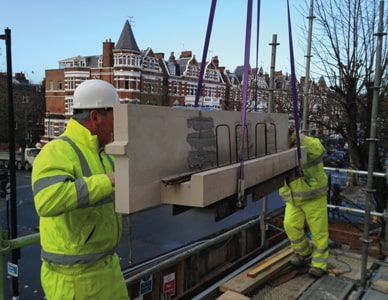Reduce Risk in Construction Projects by Using Cast Stone
It is vital to manage and reduce risk in construction projects, whether the projects are extensions or improvements, self-builds, one-off architect-designed houses, or major developments of residential or commercial properties. Reducing risk helps to avoid undue delays, increased costs and quality issues. Provided a reputable supplier is selected, cast stone reduces project risk considerably in comparison with using quarried and dressed natural stone, yet the end result is the same: increased visual appeal and resale value. See Top Ten Reasons to Specify Cast Stone.
Using a UK-based manufacturer such as Procter Cast Stone helps to ensure that deliveries can be made to an agreed schedule. This means there is no waiting for late deliveries, and the cast stone units do not have to be stored on site for longer than is absolutely necessary – which therefore reduces the risk of the units incurring damage. Furthermore, if there are delays to the construction project for other reasons, the deliveries can be rescheduled at no cost to the contractor. On the other hand, if there are design changes or if a unit suffers irreparable damage, new units can be manufactured and delivered to site far more quickly than if natural stone were being used – and with a guaranteed colour match. Note that minor damage to cast stone can often be repaired relatively easily in situ by the manufacturer.
Cast stone is manufactured in a factory environment, with reputable suppliers adhering to both British Standard BS 1217 and the UKCSA Specification – the UK Cast Stone Association’s own standard, which specifies a strength at least 40 per cent greater than that laid down in the British Standard. Customers using such suppliers can therefore be certain of receiving a consistently high-quality product that also meets contractual requirements such as limits in variability of colour and surface texture. In addition, the manufacture of cast stone is a well understood and closely controlled process, so tight tolerances can be held on specified dimensions to reduce the risk of problems arising during installation.
Another important way in which the use of cast stone can de-risk construction projects is through the technical consultation and support that is available from leading suppliers. In the design stage of a project, Procter Cast Stone can provide detailed advice in relation to geometrical forms that are robust and cost-effective to manufacture, as well as technical information about fittings, mortars and site handling. For construction projects in Conservation Areas and/or involving Listed Buildings, Procter Cast Stone can also support planning applications if there is a risk that planning authorities might raise objections to the use of cast stone rather than natural stone.
When it comes to budgeting, cast stone offers a further advantage in that its production in a factory environment means that budget prices are accurate – so it is unlikely that there will be significant discrepancies between budget prices and firm quotations (and using a UK-based supplier eliminates any risks relating to exchange rate fluctuations).
As can be seen from the above, using cast stone can help significantly in reducing risk with construction projects, though it is essential to use a reputable supplier such as Procter Cast Stone.
To help architects and specifiers gain a better understanding of cast stone and maximise the benefits of this versatile material – including using cast stone to reduce risk in construction projects – Procter Cast Stone has published a series of guides and other information resources. These are available free of charge from the Downloads section of the website or request copies by telephoning us or emailing info@proctercaststone.co.uk.



